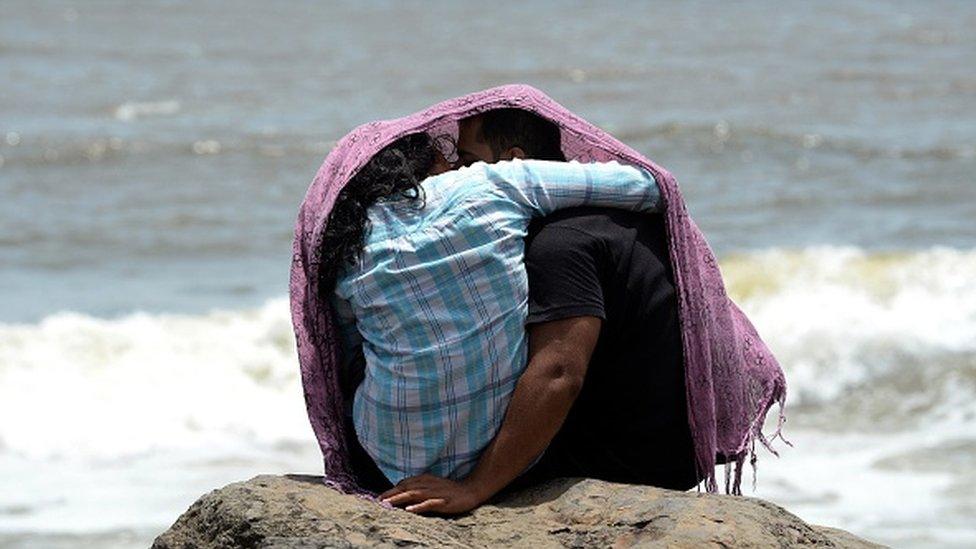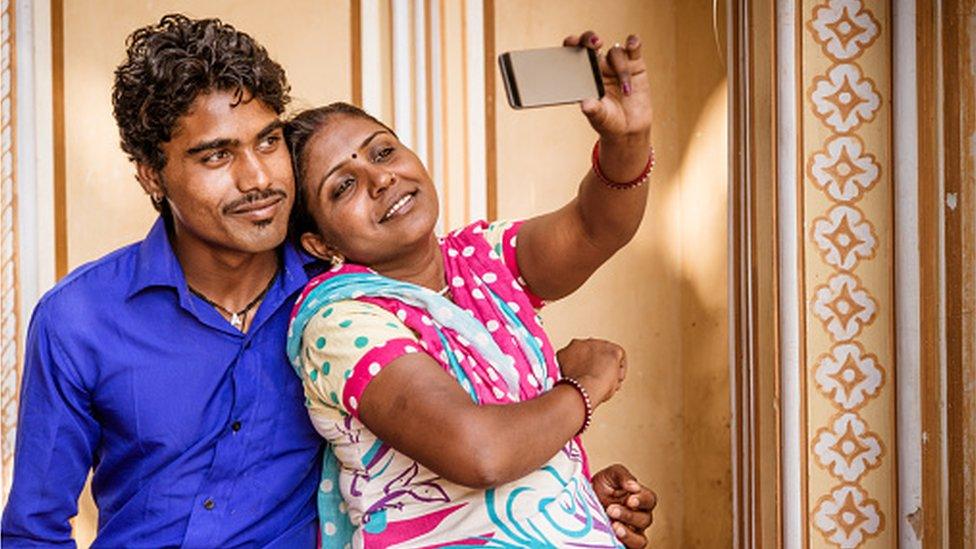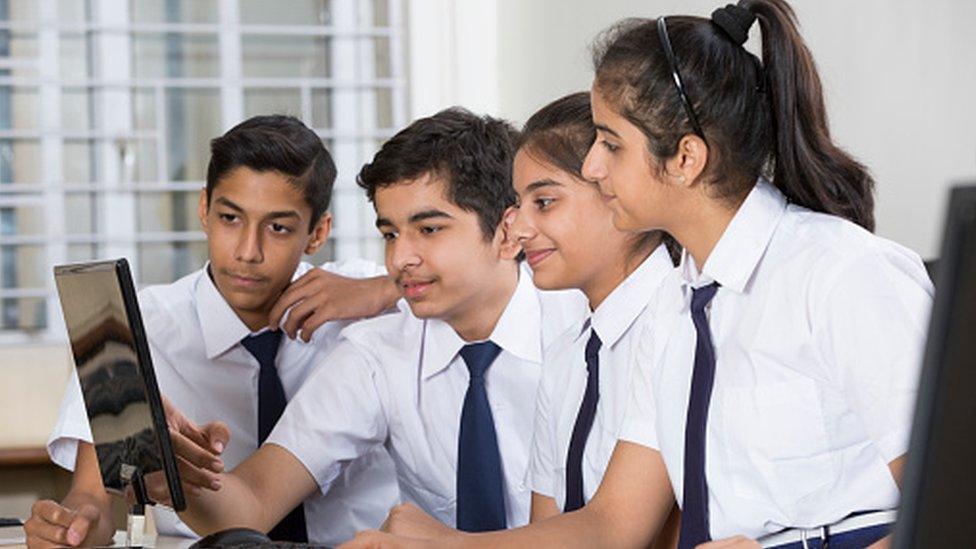Age of consent: Why is consensual teen sex a crime in India?
- Published

Even though premarital sex is taboo in India, surveys reveal that a vast number of teenagers are sexually active
A decade ago, India introduced a tough new law to deal with cases of child sexual abuse.
But as the Protection of Children from Sexual Offences (Pocso) Act criminalises all sexual activity by children under 18, many adolescent boys in consenting relationships are finding themselves on the wrong side of law.
Now there are growing calls to take a fresh look at the "age of consent" and decriminalise teenagers who have sex.
Some years ago, while working on a report on police deploying female beat constables in a crime-prone district of Delhi to improve women's safety, I was taken to meet a 16-year-old who had allegedly been raped.
"She's a rape victim," the policewoman introduced us.
But when I asked the girl for her story, she denied that she'd been raped.
"Main apni marzi se gayee thi [I went with him willingly]," she instead said.
As her mother began shouting at her, the policewoman ushered me out.
The girl's parents had lodged a complaint against a teenaged boy from the neighbourhood, she said, adding that he had been arrested and would be tried for rape.
She agreed that the girl's relationship appeared to be consensual, but said the police had no choice but to lodge a case.
The case I witnessed years ago is just one of thousands involving teenage Indian girls in sexual relationships that get branded as rape every year.
A stringent law like Pocso was needed because of the high incidence of child sexual abuse - according to a 2007 government study, 53% of children said they had faced some form of sexual abuse.
But it also increased the age of consent from 16 to 18, which effectively turned million of adolescents into criminals if they have sex.

Indian courts have acknowledged that a relationship amongst minors or minors with young adults is natural biological attraction
With more than 253 million adolescents, India is home to the largest cohort of teenagers anywhere in the world and even though premarital sex is taboo, surveys reveal that a vast number are sexually active.
More than 39% of women told the recent National Family Health Survey (NFHS-5) - the most comprehensive survey of households by the government - that they had sex before they turned 18 and 10% in the 25-49 age group said they had done so before they were 15.
So calls are now growing louder for the age of consent to be lowered to 16, much like in the rest of the world, including in many South Asian countries.
Child rights activists say the parents often use the criminal justice system to control girls' sexuality and deter them from being in relationships, especially those that are inter-caste or inter-faith.
They say criminalising consensual sexual activity is ruining lives and clogging the overburdened criminal justice system.
Now for the first time, there's data on the scale of the problem.
Researchers from Enfold Proactive Health Trust, a child rights charity, studied 7,064 Pocso court judgements delivered between 2016 and 2020 in three Indian states - West Bengal, Assam and Maharashtra. Nearly half of the cases involved girls between 16 and 18.
Their report, released earlier this week, external, found that 1,715 cases - or one in four - fell within the "romantic" category.
If the numbers are collated from across India, the report says, they would be a lot higher as tens of thousands of Pocso cases reported annually said the offenders were "friends/ online-friends or live in partners on pretext of marriage".
"Criminalising adolescent sexual activity, which is perfectly normal, shows the law is out of sync with reality," Enfold's lead researcher Swagata Raha told the BBC.
The report says most of the cases were lodged by the parents or relatives of the girls if they eloped from home or were found to be pregnant and in a majority of the cases, police invoked charges of rape, sexual assault, sexual harassment or kidnapping.
"And the couple get embroiled in the criminal justice system," Ms Raha says, adding such criminalisation can have "grave consequences" for both the girl and the boy.
"The girls are shamed, humiliated and stigmatised, and if they refuse to go back to their parental home, they are lodged at shelters. The boys are treated as children in conflict with law or accused and many are locked up in observation homes or prison for long periods.
"The accused then has to go through investigation, detention and trial and could face 10 to 20 years in prison in case there's a conviction," she adds.
There is a silver lining though - the vast majority of the 1,715 cases Ms Raha and her team studied ended in acquittal.

With more than 253 million adolescents, India is home to the largest cohort of teenagers in the world
"Acquittals were the norm in romantic cases with 1,609 or 93.8% being dismissed, while convictions were an exception and recorded in only 106 cases (6.2%)," the report says.
This low conviction rate was because in 87.9% of cases, girls admitted to being in love with the accused; in 81.5% of cases, they did not say anything incriminating against their partner; and, in some cases, they said they had been pressured by their family.
The high rates of acquittals also show that trial courts often take a lenient view while dealing with "romantic" cases. Over the past few years, India's higher judiciary has also flagged criminalisation of consensual sex amongst or with adolescents as a concern.
In 2019, while overturning the conviction of a teenager, the Madras High Court's Justice V Parthiban said that a relationship amongst minors or minors with young adults was "not unnatural but a result of natural biological attraction, external" and recommended a revision of the age of consent.
And recently, Chief Justice of India Dhananjay Chandrachud also weighed in on the issue, calling on parliament to rethink the age of consent.
Unicef too has been nudging India towards decriminalising adolescent sex. Soledad Herrero, the organisation's chief of child protection in India, told the BBC that "children have the right to protection, integrity, dignity, and participation, including in their personal relationships".
"There is a need to strike a balance between protection and respect for their evolving autonomy," she said, adding that the UN Committee on the Rights of the Child had underscored this.
Ms Raha says "there's acknowledgment" from the judiciary and those in the criminal justice system that there's a need to look at these "romantic" cases differently and parliament must take a fresh look at the law.
"We are calling for the decriminalisation of consensual adolescent sex - we can look at a model that's suitable to India, but we need to recognise that adolescent sexuality is normal."

Read more India stories from the BBC:
